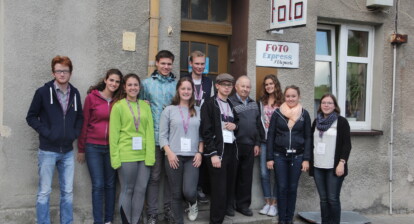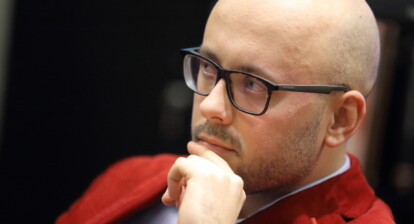With freedom of press endangered in many parts of Europe and the work of independent journalists becoming harder and harder we wanted to know first hand what it is like to work as a journalist with an interest in human rights and female empowerment in today’s Poland. Five of our young journalists met Iwona Reichard, Deputy Editor and Lead Translator of the New Eastern Europe in Gdańsk and talked with her about the media landscape in Poland and journalistic values/ethics.
Using her magazine as a platform to educate people on an international level, she succeeds in raising awareness of pressing issues and inspiring young women across the world to fight for their rights. Her experience as a researcher and an intern with Foreign Policy Magazine in Washington DC has shaped her personal ethics to the extent that she realises the importance of the media in shaping the predominant characteristics of a society. With this in mind, she aims to break negative stereotypes through her work and shatter the glass ceiling that exists for women in the workplace.
As a strong supporter of human rights, Reichardt stands for the empowerment of women as well, especially in Poland, where, according to her, women’s rights were a sacrifice that was made on the way to democracy. Due to the fact that the older generation neglected to raise their children in a liberal manner, the youth of Poland are now more conservative than before. This also is impeding the implementation of a system of equality and social justice in the country.
Having been strongly aware of the presence of sexism, she has the personal experience of being undermined by her superiors because of her gender. Although many women nowadays opt for an aggressive approach to establish themselves, she believes that a woman should never have to alter her personality to fit in or be respected by her male co-workers. Female representation is needed, because women are an essential part of society and as such, they should be valued as equals and judged on their qualifications, rather than on their appearance.
Her greatest concern lies with the fact that the Polish media severely lacks diversity in gender, race, religion and sexuality. This internal homogeneity has, in turn, hindered its liberalisation. As a direct result of that, Polish journalists have been denied the possibility to recalibrate their moral compass through collaboration with people with different cultural backgrounds.
Asked on perspectives, her outlook sounds grey when it comes to the immediate future: ‘‘The European dream of the 89’ generation seems more and more distant with every disagreement between the government and the European Union on the future course of action.” However, she remains an optimist, believing that crises may also bring positive changes.
by Adelina Fendrina and Elin Reese
Three more young journalists wrote about the interview with Iwona Reichhardt, you can find their articles here:
A_Womens_Suit by Eva Illiasová
About Journalism, the European Dream and Diversity by Vida Pluym, Ema Agnič

Adelina, Vida, Iwona, Elin, Ema, Eva


